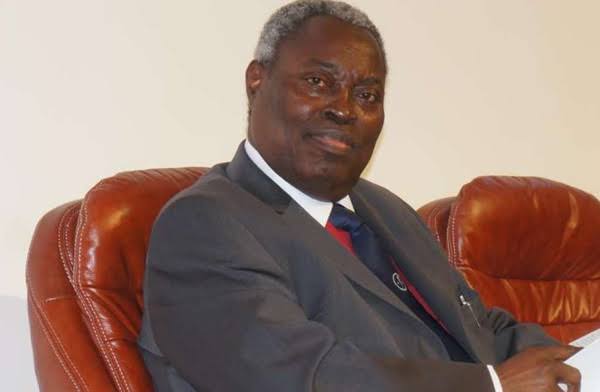In a landmark address delivered during the 2025 Global Family and Marriage Conference on Sunday, August 31, Pastor William Kumuyi, the General Superintendent of the Deeper Christian Life Ministry, announced significant modifications to the church’s longstanding marriage rules. The revered cleric emphasized that these rules, which have guided the church’s approach to courtship and marriage for decades, are not rooted in biblical mandates but are instead administrative guidelines designed to provide structure and support for members. The announcement, which has sparked widespread discussion among the church’s global congregation and beyond, reflects a broader call for discernment between divine commandments and human traditions within Christian practice.
Revising Courtship Rules: A Shift in Perspective
One of the most notable changes announced by Pastor Kumuyi is the lifting of the ban that previously prohibited a woman from visiting a man she intends to marry during the courtship period. This rule, which had been strictly enforced within the Deeper Christian Life Ministry, was intended to uphold modesty and prevent inappropriate interactions between intending couples. However, Kumuyi clarified that this restriction is no longer in place, signaling a significant shift in the church’s approach to courtship.
Under the revised guidelines, intending couples are now permitted to visit each other during courtship, provided they are accompanied by an elder. This change reflects a pragmatic acknowledgment of the need for couples to spend time together to build mutual understanding and compatibility before marriage. The presence of an elder is intended to maintain accountability and ensure that interactions remain respectful and aligned with the church’s values of purity and integrity.
Kumuyi’s announcement underscores the importance of balancing tradition with practicality. By allowing supervised visits, the church aims to foster healthier relationships while continuing to emphasize the importance of moral conduct during courtship. This adjustment is likely to be welcomed by younger members of the congregation, who may have found the previous restriction overly restrictive in the context of modern relationship dynamics.
Reassessing the Six-Month Courtship Period
Another significant change announced by Pastor Kumuyi is the removal of the mandatory six-month courtship period, which had previously been a cornerstone of the church’s marriage preparation process. The General Superintendent explained that this rule was introduced as a human arrangement to ensure that couples had sufficient time to know each other before making the lifelong commitment of marriage. However, he emphasized that the six-month period was not a biblical requirement but rather an administrative guideline.
“We just felt you need some time to know one another. And then we said one month will be too short, two months too short. So, why not six months? But it is not from the Bible,” Kumuyi stated during his address. This candid acknowledgment highlights the church’s willingness to re-evaluate its practices in light of their practical implications and biblical grounding.
By making the six-month courtship period optional, the Deeper Christian Life Ministry is granting couples greater flexibility to determine the duration of their courtship based on their individual circumstances. This change reflects a broader recognition that relationships vary in complexity and that a one-size-fits-all approach may not always be appropriate. For some couples, a shorter courtship period may suffice, while others may require more time to establish a strong foundation for marriage.
Kumuyi’s remarks also serve as a reminder to the church’s members to approach such guidelines with discernment. “As a Christian, you need to be so mature that you know the difference between the law of God and the principles in the church,” he said. “Six months is all right, but it’s not something inflexible. If we change it to three months, we’re not changing the Bible, because six months is not in the Bible.” This statement underscores the importance of distinguishing between divine commandments, which are non-negotiable, and human regulations, which are subject to change based on wisdom and context.
The Role of Marriage Committees: Guidance, Not Authority
In addition to revising specific courtship rules, Pastor Kumuyi addressed the role of the church’s marriage committees, which have long played a significant role in overseeing the marriage process within the Deeper Christian Life Ministry. These committees, composed of church leaders and elders, were established to provide guidance and support to intending couples, ensuring that their relationships align with the church’s teachings and values.
However, Kumuyi clarified that the authority of these committees is not rooted in scripture but is instead a product of church administration. “There’s no marriage committee in the New Testament. We created it to help you, not because we can give you a chapter and a verse. It is church administration,” he explained. This statement serves as a reminder that the role of marriage committees is to assist, not to dictate or impose rules that carry the weight of divine law.
Kumuyi also issued a caution to church leaders, urging them not to overstep their boundaries when guiding intending couples. He emphasized that marriage committees should operate within the limits of their advisory role and avoid exercising authority beyond what is prescribed in the Bible. This admonition reflects a broader concern about the potential for human traditions to be elevated to the status of divine commandments, a practice that can lead to legalism and undue burdens on believers.
By clarifying the purpose and scope of marriage committees, Kumuyi is encouraging a more balanced approach to pastoral oversight in matters of marriage. The committees will continue to play an important role in providing counsel and support, but their authority is subordinate to the teachings of scripture. This shift is likely to foster greater trust and collaboration between church leaders and members, as couples are empowered to make decisions in alignment with both biblical principles and their personal convictions.
A Call for Discernment: Scripture vs. Tradition
At the heart of Pastor Kumuyi’s address is a call for Christians to exercise discernment in distinguishing between God’s commandments and human traditions. Throughout his message, he emphasized the importance of grounding one’s faith in the authority of scripture rather than in man-made rules, no matter how well-intentioned those rules may be.
Kumuyi’s remarks reflect a broader theological principle that is central to the Deeper Christian Life Ministry’s ethos: the primacy of scripture as the ultimate guide for Christian living. By acknowledging that certain marriage rules were administrative rather than biblical, Kumuyi is encouraging believers to approach church practices with a critical yet respectful mindset. This approach allows for flexibility and adaptation in areas where scripture does not provide explicit instructions, while maintaining a firm commitment to biblical truth.
The General Superintendent’s warning against treating human regulations as divine is particularly significant in the context of modern Christianity, where traditions and cultural practices can sometimes overshadow the teachings of scripture. By drawing a clear distinction between the two, Kumuyi is equipping believers to navigate the complexities of faith with wisdom and maturity. This message is especially relevant for younger Christians, who may grapple with reconciling traditional church practices with the realities of contemporary life.
Implications for the Deeper Christian Life Ministry
The changes announced by Pastor Kumuyi represent a significant moment in the history of the Deeper Christian Life Ministry, a denomination known for its conservative approach to Christian doctrine and practice. The ministry, founded in 1973, has grown into a global movement with millions of members across Nigeria, Africa, and beyond. Its emphasis on holiness, biblical fidelity, and disciplined living has earned it a reputation as one of the most influential Pentecostal churches in the world.
The revisions to the church’s marriage guidelines are likely to have far-reaching implications for its members, particularly in Nigeria, where the church has a strong presence. By relaxing certain rules, such as the ban on visits during courtship and the mandatory six-month courtship period, the church is demonstrating a willingness to adapt to changing social dynamics while remaining anchored in its core values. This balance between tradition and progress is likely to resonate with members who value the church’s commitment to holiness but also seek greater flexibility in navigating personal relationships.
Moreover, Kumuyi’s emphasis on the advisory role of marriage committees may help to address concerns about overly rigid oversight in the marriage process. By clarifying that these committees exist to guide rather than control, the church is fostering a more collaborative and supportive environment for intending couples. This approach aligns with the broader mission of the Deeper Christian Life Ministry to equip believers for godly living through teaching, mentorship, and community.
Broader Implications for Christian Communities
While Pastor Kumuyi’s announcement is specific to the Deeper Christian Life Ministry, its implications extend beyond the denomination to the broader Christian community. The issue of balancing scripture with tradition is a perennial challenge for churches across denominations, as they seek to remain faithful to biblical teachings while addressing the needs and realities of their congregations.
Kumuyi’s call for discernment in distinguishing between divine commandments and human regulations offers a valuable lesson for Christian leaders and believers alike. It serves as a reminder that church practices, while often rooted in wisdom and good intentions, are not infallible and may need to be revisited in light of changing circumstances. This principle is particularly relevant in the context of marriage, where cultural and societal norms can vary widely across time and place.
The changes announced by Kumuyi also highlight the importance of pastoral sensitivity in guiding believers through major life decisions. By acknowledging the administrative nature of certain marriage rules, Kumuyi is modeling a leadership style that prioritizes humility, transparency, and accountability. This approach is likely to inspire other Christian leaders to re-evaluate their own practices and ensure that they are grounded in scripture rather than tradition alone.
Reactions and Expectations
The announcement has generated a range of reactions among members of the Deeper Christian Life Ministry and observers within the broader Christian community. For some, the changes represent a welcome step toward greater flexibility and relevance in a rapidly changing world. Younger members, in particular, may appreciate the opportunity to engage in supervised visits during courtship and to have more control over the duration of their courtship period.
However, others may approach the changes with caution, concerned about the potential for relaxed guidelines to lead to compromises in the church’s commitment to holiness and purity. Given the Deeper Christian Life Ministry’s emphasis on strict moral standards, some members may worry that these revisions could signal a broader shift in the church’s identity. Pastor Kumuyi’s careful clarification that the changes are administrative rather than doctrinal is likely intended to address such concerns and reassure members that the church’s core values remain unchanged.
As the Deeper Christian Life Ministry implements these new guidelines, it will be important for church leaders to communicate clearly with members and provide guidance on how to navigate the revised rules. Training for marriage committees and elders will also be crucial to ensure that they approach their advisory role with humility and wisdom, in line with Kumuyi’s admonition.
Conclusion
Pastor William Kumuyi’s announcement of modifications to the Deeper Christian Life Ministry’s marriage rules marks a significant moment in the church’s history. By lifting the ban on visits during courtship, making the six-month courtship period optional, and clarifying the advisory role of marriage committees, Kumuyi is demonstrating a commitment to balancing tradition with practicality. His emphasis on distinguishing between scripture and human regulations offers a powerful reminder of the importance of grounding Christian practice in the authority of the Bible.
These changes reflect the Deeper Christian Life Ministry’s ongoing effort to remain relevant and responsive to the needs of its members while upholding its commitment to holiness and biblical fidelity. As the church moves forward, the implementation of these revised guidelines will likely shape the experiences of countless couples and influence the broader Christian community’s approach to marriage and courtship. Through his thoughtful leadership, Pastor Kumuyi is paving the way for a more discerning and adaptable approach to Christian living, one that honors both the timeless truths of scripture and the evolving realities of the modern world.








